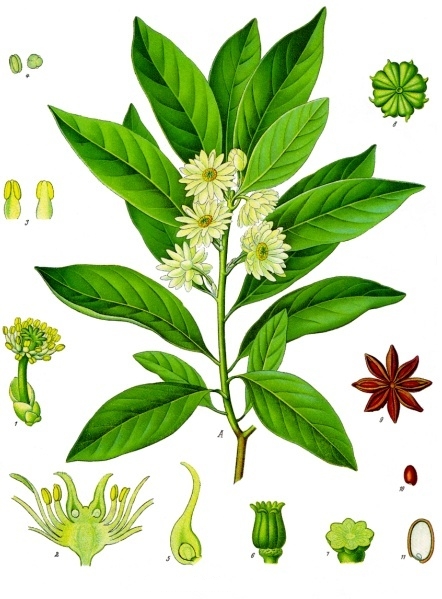- Japanese star anise
Taxobox
name = Japanese star anise

image_width = 250px
image_caption = Japanese star anise
regnum =Plant ae
divisio = Magnoliophyta
classis = Magnoliopsida
ordo =Austrobaileyales
familia =Illiciaceae
genus = "Illicium "
species = "I. anisatum"
binomial = "Illicium anisatum"
binomial_authority = L.
synonyms ="Illicium japonicum"Sieb.
"Illicium religiosum"Sieb. etZucc. The Japanese star anise ("Illicium anisatum") is a tree similar to Chinese star anise. It is highly toxic, therefore it is not edible; instead, it has been burned as
incense inJapan , where it is known as shikimi. Cases of illness, including "serious neurological effects, such as seizures", reported after using star anise tea may be a result of using this species."I. anisatum" is native to Japan. It is similar to "I. verum", but its fruit is smaller and with weaker odor, which is said to be more similar to
cardamom than toanise . While it is poisonous and therefore unsuitable for using internally, in Chinese medicine it is used for treatment of some skin problems.Japanese star anise contains
anisatin ,shikimin andsikimitoxin , which cause severe inflammation of thekidneys ,urinary tract and digestive organs. Other compounds present in toxic species of "Illicium" aresafrole andeugenol , which are not present in "I. verum" and are used to identify itsadulteration .Anisatin and its derivates are suspected of acting as strong
GABA antagonists.It is impossible to recognize Chinese and Japanese star anise in its dried or processed form by its appearance only, due to morphological similarities between the species.
There are cases of
product recall s when products containing star anise were found to be contaminated by Japanese anise. Cases of consumers admitted to hospital with neurological symptoms after ingesting excessive doses of star anise or smaller doses of products adulterated with Japanese anise were described as well.See also
*
Star anise External links
* [http://www.fda.gov/bbs/topics/NEWS/2003/NEW00941.html FDA Issues Advisory on Star Anise "Teas"]
* [http://pediatrics.aappublications.org/cgi/content/full/peds.2004-0058v1 Neurotoxicities in infants seen with the consumption of star anise tea]
Wikimedia Foundation. 2010.
